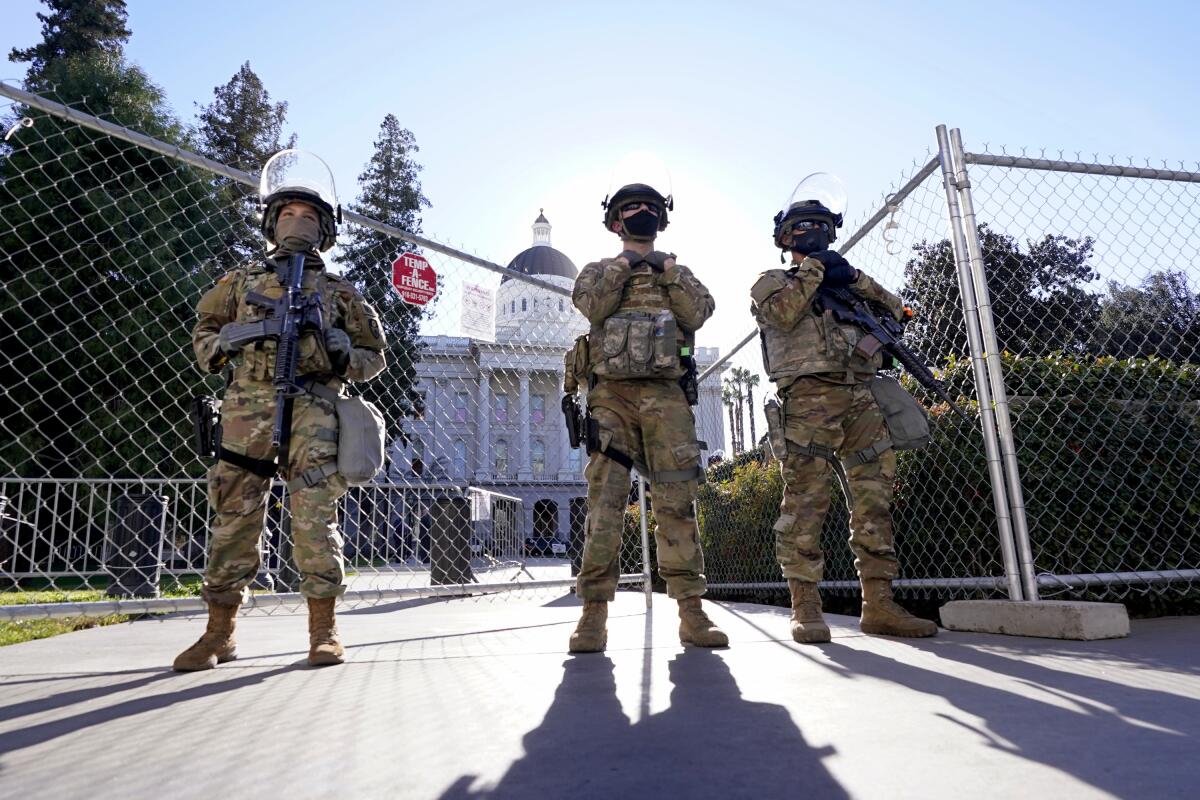A general is fired from the scandal-plagued California National Guard

- Share via
In yet another ouster of a top commander for the troubled California National Guard, a brigadier general has been fired after internal inquiries found that he inappropriately used military personnel for personal tasks, had a subordinate complete part of his cybersecurity training and otherwise engaged in conduct that seeded distrust in the ranks.
Brig. Gen. Jeffrey Magram will be “involuntarily transferred” next week to the U.S. Air Force retired reserve, an action that is “parallel” to a firing, California National Guard spokesman Lt. Col. Brandon Hill said Friday.
Magram, who was once director of the Guard’s air staff, is the fifth general to resign, retire or be fired in the wake of scandals exposed by Times investigations of the organization over the last four years.
Most of the allegations against Magram were first disclosed in a Times report in June. Weeks later, the longtime head of the Guard, Maj. Gen. David Baldwin, retired.
In an email to The Times, Hill said an internal disciplinary board substantiated the allegations against Magram, and the general was removed “for cause.” The board’s action came after two separate inquiries into Magram’s conduct by military inspectors general; directives to dismiss him were issued by Gov. Gavin Newsom’s office and Baldwin’s successor, Maj. Gen. Matthew Beevers, the Guard’s acting adjutant general.
A recent spate of alleged misconduct by high-ranking officers underscores the need for reform in California’s National Guard, current and former Guard members say.
Attempts to reach Magram for comment were unsuccessful. Beevers and Newsom did not respond to requests for comment made through spokespersons.
In a memorandum to Magram that The Times obtained this week, Beevers wrote, “Your conduct has caused me to lose faith, trust, and confidence in your ability to continue serving.”
The 20,000-member Guard, a branch of the California Military Department, which is also led by the adjutant general, serves a dual mission that includes responding to emergencies in the state, such as earthquakes, wildfires and civil disturbances, and assisting U.S. armed forces in military operations overseas.
Magram attained the rank of assistant adjutant general and had been part of Baldwin’s inner circle. However, in 2021, Baldwin suspended him with pay and reassigned him after a Times report that Guard members were concerned that their leaders had readied an F-15C fighter jet for a possible mission in which the aircraft would fly low over civilian protesters to frighten and disperse them.
Baldwin denied that the jet had been prepared for such a deployment and said the move against Magram had nothing to do with the report. He said the same about his decision to fire Maj. Gen. Gregory Jones, commander of the air wing of the Guard.
Magram became the focus of more upheaval last summer, when The Times disclosed that an internal probe found that he had on-duty Guard members drive him up to 120 miles round-trip to personal dental and medical appointments at Travis Air Force Base, according to a confidential report on the inquiry. The document quoted one unnamed Guard member as saying he did not want to drive Magram because “my job is to take care of the airmen in the state of California and not be a chauffeur for a general.”
The California National Guard has been buffeted by allegations of misconduct in its upper ranks, coverups and retaliation against whistleblowers.
A Guard member who took Magram’s mother shopping was quoted in the report as saying that “she was particular. When I say particular, it had to be at Whole Foods. … It just took her a long time to decide what she wanted, a lot of comparison shopping amongst products.”
Magram had generally confirmed the members’ accounts of running errands for him, according to the report. He said he believed that having subordinates give him rides to medical appointments was consistent with the Air Force’s “wingman concept,” in which Guard members look out for one another.
“I want to reiterate that had I ever heard of any ethics issues like this from subordinates, peers or commanders, or perceptions of such, I would have corrected or addressed it on the spot,” Magram said in a statement to an inspector general.
However, Magram had been counseled in 2017 that tasking Guard members for rides to personal appointments was inappropriate, the report stated, adding that his “wingman” argument “rings hollow.” The investigation similarly faulted him for using an underling to work on his travel awards accounts, including for personal trips.
The inquiry also determined that Magram failed to complete his annual cybersecurity training and thus had lower-ranking Guard members each day request that headquarters temporarily restore his computer access. This went on for about two weeks, until he had the training completed by a subordinate. Magram said in his statement that he was late in completing the training because of “a tremendously busy operational tempo.”
The Air Force initially issued a letter of admonishment to Magram as a result of the first inspector general investigation. After queries by The Times, however, the Guard said a second inquiry had substantiated similar allegations against him, and another round of discipline was pending. That culminated in his firing.
The Guard memo obtained by The Times says Magram on several occasions “wrongfully encouraged or requested subordinates” to perform tasks or run errands for him outside their military duties, such as giving him rides to personal appointments. The document also cites the cybersecurity episode as grounds for dismissing him, stating that he “let a subordinate click through the training questions and obtain a certificate of completion for you.”
The memo further recounts that a 2021 survey of Guard members found that they “experienced significant issues with unit cohesion, good order, and military discipline because of [Magram’s] conduct.”
In early 2019, a Times report disclosed internal complaints of reprisals against whistleblowers and allegations of a cover-up of misconduct among the Guard leadership. The complaints focused on the organization’s Fresno air base and included an incident in which someone urinated in a female Guard member’s boots. Baldwin later removed the commander of the Guard’s air side, Maj. Gen. Clay Garrison. The commander of the 144th Fighter Wing at the Fresno base was also removed.
In 2020, in response to another Times report, Newsom’s office denounced the Guard’s decision to send a military spy plane to suburban El Dorado Hills, where Baldwin lived, to help civilian authorities monitor demonstrations over the police killing of George Floyd. Baldwin said the fact that he resided in El Dorado Hills, where the protests were small and peaceful, had no bearing on the deployment of the RC-26B reconnaissance plane.
The Times reported last year that an internal inquiry substantiated allegations that Brig. Gen. David Hawkins made antisemitic and homophobic slurs, including that Jews are unrepentant sinners and that gay marriage is a reason terrorists attack the United States. Hawkins received a letter of reprimand as a result, the Guard said. Responding to a subsequent Times query, the Guard confirmed in June that Hawkins had resigned.
Hawkins told The Times that “those allegations are largely untrue” and specifically denied making the statement about terrorist attacks. He said he believed the allegations were lodged by someone who overheard and misconstrued a conversation he had with a chaplain.
More to Read
Sign up for Essential California
The most important California stories and recommendations in your inbox every morning.
You may occasionally receive promotional content from the Los Angeles Times.













